|
Arguably there is no character in pop fiction who is quite as popular as Sherlock Holmes. The heroic investigator first crept onto the page in 1887. Years later, he’s in the public domain and many have told of his adventures. One such storyteller was writing for television when he came across an idea for a rather unorthodox Holmes story. British writer Jeremy Paul wrote scripts for a long-running British TV adaptation of Sherlock Holmes that was on the air from the mid-’80s to the mid-‘90s. Somewhere in the midst of that, he wrote a stage play that was distinctly unlike the typical Sherlock Holmes story that play is now being staged at the historic Brumder Mansion courtesy of Milwaukee Entertainment Group. The Secret of Sherlock Holmes' deviation from expectation is apparent in the cast, which consists entirely of Holmes, his associate Dr. Watson and the looming shadow of his arch-enemy Professor Moriarty. With such a small cast, the drama is perfect for a cozy, little space in a mansion that was built in an era where creator Arthur Conan Doyle was still writing Holmes’ original stories. (The space has a history with Holmes. It had also played host to Liz Shipe’s Holmes trilogy in relatively recent memory.) Directors Tom Marks and Amanda J. Hull have an excellent pair of actors to work with on the show. Randall T. Anderson has a very precise charisma about him in the title role. He handles the daunting task of breathing life into a character played so well by so many others in the past. As the title suggests, the script delves not into any other mystery than Holmes himself. Anderson inhabits the twin roles of mystery and detective quite well. A torch cast directly into the heart of one of the most celebrated figures in all of literature would challenge any actor. Anderson allows the legend to be both approachable and impossibly mysterious at the same time. It’s quite an accomplishment. Jim Owczarski is the other half of the cast. He plays Watson. Owczarski lends an emotional gravity to the drama in the role of Holmes’ longtime associate. Thankfully, the playwright delicately allows Watson something approaching equal intellectual footing for Holmes, which is absolutely essential if he’s going to be the only other guy onstage. The drama focusses-in on the relationship between the two colleagues. A good portion of what Owczarski is accomplishing here is simply playing host between Holmes and audience...giving him a warm social space in which to inhabit. More than that, though, Owczarski has a sharp, dry wit about him that lends the character a classiness that comes to equal that of the deeply troubled Holmes. The tradition of Holmes’ stories has the detective piecing together disparate bits of information to solve an ostensibly unsolvable crime. It’s a bit like stage magic: present the mystery, lift the curtain and show the solution. Everyone is mesmerized and feels a bit pleasantly like an idiot. What’s quite clever about Paul’s presentation here is the fact that it ISN’T a traditional Holmes mystery. Here’s how it worked for me: the mystery of Holmes is presented. A central premise of the story is revealed. Instinctually, I knew what the probable solution to the problem would have been. The plot ran its course. Holmes outlined a theory which backed-up what I instinctually thought was the right answer and then proceeded to defend that theory. Holmes is working hard to understand that which seems quite apparent. This was my experience with the show anyway: It's just the reverse of traditional mystery fiction. Your gut instinct is right and what seems impossible turns out to be plausible. You walk away from the whole experience feeling fiercely clever without having had to do a whole lot of work. I don’t know that Paul had intended this when he wrote the script, but if he did, it’s quite a way to tell a story. Anyway...mystery aside, this is the story of a couple of friends who care about each other. One of them is plagued with the distortions of genius. The two of them work through the inner demons. It all plays-out quite briskly with a brief intermission. It’s a fun, uniquely dramatic experience in a historic space. Milwaukee Entertainment Group’s production of The Secret of Sherlock Holmes runs through Feb. 10 at the Brumder Mansion on 3046 W. Wisconsin Ave. For ticket reservations and more, visit Milwaukee Entertainment Group online. One More Thing: Later-on this year, Randall Anderson tackle the daunting role of another detective as he appears in Columbo with the Alchemist Theatre.
0 Comments
It’s Everyone’s Favorite Bug: Gregor! My wife asked me where I was seeing The Metamorphosis. I told her it was on the East Side. She said that it seemed like an appropriate place for someone to turn into a bug. Everybody knows about Gregor: the man who turned into a giant bug. It’s easy to hold Kafka’s classic tale at a distance. Accept the story of a man turning into a giant bug as a novelty and it becomes weirdly-cool. It’s highbrow horror that falls victim to the same problems plaguing all horror. Accept the concept on a superficial level and you don’t have to engage with it on a deeper level at all. It’s a horror show. A monster story. Nothing more. No Chitin, No Carapace, No Problem Conceived of and directed by Isabelle Kralj, Theatre Gigante’s approach to the classic story engages it on a psychological level that avoids the whole superficiality problem altogether. There’s no exotic make-up or creature costuming effects. It’s all just people. Ben Yela is the internal psyche of Gregor through monologue. Edwin Olvera plays the physicality of it. We see it all play out in movement that feels very real and visceral. Emotional reactions stand-in for the horrific-fantastic. Kralj delivers it to the stage in a way that feels very emotionally real. The Small of Apples. The Slosh of Milk What the show lacks in antennae and mandibles it more than makes up for in smashed apples and spilled milk on a shiny, black surface. Olvera casually nibbles on pieces of apple that had been thrown against the grown by Ron Scot Fry. At one point Yela sinks his head into a giant metal bowl to go bobbing for milk-soaked bread. There’s an audible reaction of revulsion from someone in the audience. Yeah...becoming a bug isn’t pretty. Neither is watching someone become a bug. It’s pretty messy onstage by the end of the show. It’s Not Just the Insects: We’re All Creepy On some level, we’re all becoming bugs in a human world. It happens over time. Some call it getting older. There’s an injury. There’s a condition. There’s a physical tic of some sort that surfaces. Humanity gets itched-away one scratch at a time. Telling the story of The Metamorphosis without any external representation of the horror allows this to settle-in on around the edges of normal human performance. Olvera plays the most obvious monster here with Yela as his psyche, but every member of the cast plays a creepiness: sister, mother and father. Selena Milewski is creepy-cute, Hannah Klapperish-Mueller is creepy-caring and Ron Scot Fry is creepy-creepy. There’s real humanity in every performance onstage, but people forced to live with a giant bug all kind of become buggy-insectoid in their own way. There’s sudden snaps of reaction and a weird uniformity in an eerie unison that sometimes resonates through them. Eyes cast across the stage and into the rest of the audience and we all feel a bit like a swarm of twitchy, creeping attendees watching one of our own. But Really It’s Just About A Guy Who Can’t Go To Work Anymore (Damn: This Is Going to Get Political Before I’m Finished With It.) Stripped of the superficial horror, it’s difficult not to see the human element of the story as a reflection of current issues with healthcare funding. Gregor’s a middle-class guy with a serious medical condition. If he could only make it out of the house for some treatment he would, but he really has to make it out of the house for work and there’s no way he’d be able to pay for the time off. He’s supporting his entire family as a traveling salesman. He’s a regular middle-class guy who travels a lot. He’s probably got frequent flyer miles and a string of hotel rooms and convention centers in his past. He’s got rent to pay for his whole family and his sister to put through a conservatory program so she can become a great concert violinist...no time or PTO to stop and casually become a bug for a few days or forever. Can’t allow yourself the luxury of that. There are bills to pay. All the concerns of a middle class guy are a lot of pressure to begin with. Add to all of it this medical condition...and the fact that he’s not able to save for retirement or whatever. It all becomes kind of a reflection of everything that we’re going to have to deal with as the Baby Boomers continue to age and collect all those little tics and scratches that are turning us ALL into large invalid insects once incident at a time. There are Republicans who have stated that there’s no inalienable right to health care. It’s a privilege. But if you’re not an entomologist then you’re an exterminator. Either you want to help Gregor or you want to get rid of him. You can’t just shove him into a room and hope that he gets better. (Unless, of course, you’re into that sort of thing in which case...y’know...don’t be surprised when you see compound eyes and a pair of antennae in the mirror the next time you look. Time turns us ALL into insects just like Gregor.) Theatre Gigante’s production of The Metamorphosis runs through Jan. 28th at the Kenilworth 508 Theatre. A concise review of the show runs in the next print edition of the Shepherd-Express. Gigante’s next production is Rok Vilčnik’s stage adaptation of Tarzan Mar. 16-24 in Kenilworth 508. For more information, visit theatregigante.org It’s About Family This month, Renaissance Theaterworks stages the provocative contemporary family drama Russian Transport. Originally staged in New York a little over half a decade ago, the story concerns itself with a Russian immigrant family living in Brooklyn. A casual visit from a member of the family reveals a dark criminality. The truth emerges from the shadows over the course of a couple of hours’ fully-engrossing drama. My wife and I had the good fortune of sitting in the front row for last night’s preview performance. A Home Onstage Scenic designer Jason Fassl does a wonderful job rendering a domestic reality onstage. It’s Brooklyn. Sheepshead Bay. From the kitchen viewed in a far edge of the stage to the dining room, living room and teenage girl bedroom, there are enough details present that it almost feels weird to see it all onstage. It feels real enough that the fourth wall feels like a lens into a space where people are actually living and feeling...not an easy thing to do in a studio theatre environment. There are really interesting visual themes as well...there’s a wall of old family photos up the stairs in the center of everything that have old family photos in them...immigrants remembering a past. Look over to the right of that and there’s a hug collage from the teenaged daughter...so many pictures and a map of the world. Dreams of someplace else from someone who just might go there. Dynamic The collage on the daughter’s wall is an interesting opportunity for a scenic designer to aid in the portrayal of a very sophisticated character. April Paul does the rest of the work. She’s playing Mira--a high school student who is trying to convince her mother to allow her out to Italy on a foreign study program. Her mother is a sharp wit played by Elizabeth Ledo with a cunning sense of depth. Mira’s mom doesn’t want her to go. She’s got secrets, but so does Mira...and everyone else in the family. Wielding the single most convincing Russian accent in the whole ensemble, Mark Puchinsky plays visiting uncle Boris. The son of Russian immigrants to Milwaukee, the now Brooklyn-based Puchinsky lends the entire show that extra level of authenticity. Puchinsky has a dark charisma as Boris, who has come-in from elsewhere. It’s unclear at first precisely what he might be doing in Brooklyn, but his presence corrupts secrets out of the shadows and into plain view in a gripping story that echoes reflections of criminal intentions and human trafficking. The Psychological Need For Distance A story that ultimately deals with the subject of human trafficking can be a tricky one to deliver to an audience. The term is simple enough. As is the concept. As an audience, though, it’s really difficult to deal with the concept without building a huge emotional distance from the subject. It’s just too...alien a concept to make a connection with. And yet...it’s right here in the city. According to a report in the Guardian in 2015, ”Milwaukee is tied with Las Vegas for the third highest number of young people rescued during the FBI raids across the US.” Wisconsin is a hub of human trafficking. It’s really important for Renaissance Theaterworks to take a look at this and bring awareness to it because we can’t afford to look away. It’s right here. Director Laura Gordon does a really good job of bringing everything together in a way that makes it seem perfectly relatable, which goes a long way toward making it all feel very, very heartbreakingly real. It’s the little things that make it all quite vivid. The Meal Sit at the front of the house to the left if you can. That’s where the dining room table is. When Boris arrives, they all have dinner. And they’re all eating. Really. There is the sound of silverware against plates. The actual process of eating, which rarely gets staged. There’s a remarkably organic feel about a family eating together onstage...if they’re really eating there’s an added layer of reality. Phones and Brands It’s not something you’re likely to notice unless you’re in the front row on the leftt, but when Boris takes a picture of Mira on his phone...he’s actually taking a picture of Mira on his phone. There’s the sound of the click and that little flash that’s distinct to an iPhone. But if you’re sitting on the left in the front row...you can see April Paul in character looking into the camera of Mark Puchinsky in character as Boris taking the picture. It’s a moment between the two characters that might only feel vaguely creepy in the moment if you’re unaware of any of the rest of the plot, but the tangibility of that moment wouldn’t have been what it was without an active phone. Sit in the front row and you can practically see the wallpaper on the screens of the phones. It would be all too easy to simply mime everything with the phones, but it’s so much less authentic if they’re not actually being used. Russian Transport makes this all the more necessary as Mira’s brother works for Verizon. Max Pink plays Alex--a young guy who works in a store selling phones for a company that gets its name mentioned enough that...you’d think playwright Erika Sheffer got paid by the company for embedded marketing. It works, though. That and the presence of a couple of other brands firmly roots the story in a concrete contemporary American reality. Remember: human trafficking isn’t just something that goes on in glowing screens and on stages and things. It happens in a real world with real world brands. People need to acknowledge human trafficking the way they acknowledge the reality of Verizon or Cheerios. It’s all too easy to pretend it doesn’t exist. The Strange Stillness of the Car Max Pink is ultimately hired to do a little bit of extra work that happens to include driving girls...all of whom are played by April Paul in a series of subtly naturalistic deviations. It’s really cool to see Paul play three different women without exaggerating the difference between them. Each one has arrived in New York from Russia, but there’s a subtle difference between each of them that feels very natural. The car itself is just a seat that pulls out of the front of the stage. Pink mimes the movements of driving quite well, which is can be really difficult to do onstage without looking remarkably silly. The Russian flows quite heavily in those scenes. It’s been years since I’ve taken Russian and I haven’t used it since college. A first or second year Russian student can pick-up most of what’s going on, but you don’t have to know what’s being said to understand it. That first scene with his first...chauffeuring job is remarkably delicate. Even if you don’t know Russian, you know his reaction to her telling him how old she is. He plays it cool, but you know...and Pink is quite compelling as someone clearly in WAY over his head. It doesn’t become completely clear just HOW in over his head Mira’s brother is until the nature of his work is revealed to her father, played with a stern gravity by Reese Madigan. Madigan is a steely paternal presence onstage which rounds-out the ensemble of a shockingly memorable drama. Renaissance Theaterworks’ production of Russian Transit officially opens tonight and runs through Feb. 11 at the Broadway Theatre Center Studio Theatre. For ticket reservations and more, visit Renaissance Theaterworks online. It’s A Casual Line, But It’s really Cool Somewhere in [title of show], an actress is told that she’s ben a bit quiet. In the role of the actress, Amber Smith casually mentions that she hadn’t had a line until that moment. Amber Smith is the actress who said that she hadn’t had a line until that moment, but she was saying the line about not having a line in character as an actress named Susan. Smith is an actress playing an actress who is playing an actress who is herself in the process of rehearsing a musical that’s being staged about a musical that’s being produced. All of this is implicit in a casual moment where she happens to mention that the line she’s speaking is the first line she’s scripted to have in the scene. It’s a sweetly clever moment in the show. It's indicative of the weird existential funhouse that is [title of show]. It’s Really Fun to Write Some of the Sentences in This Blog Entry [title of show] is contemporary musical theatre in the mold of Pirandello’s Six Characters in Search of an Author. It’s a brief musical about a couple of guys (Doug Clemons and Matt Zeman) writing a brief musical. The musical they’re writing is the musical that they’re in...and rehearsing. You don't have to think about any of the deeper stuff, though. Watch it casually and you’re hanging out with 4 actors. Watch it a bit more deeply and it’s a really dizzying metaphysical musical. I'll say it again: Zeman and Clemons play a couple of actors in New York who are playing themselves in a musical about themselves writing a musical that they are in. It’s a show abut a show that is the show that the show is about. Right now I’m trying to figure out whether or it's hopelessly silly or it’s conceptually the best musical I’ve ever seen. Or maybe it’s just really good. I dunno. Did I Mention We’re All Onstage? Director Brian Bzdawka has the cast on a set onstage that is also occupied by the audience. This is the Greendale Community Theatre and they have a HUGE stage (relative to so many small stages in and around Milwaukee.) On one level, it’s only practical to have a show like this in a studio theatre space, but on another level it’s actually really, really clever to have the audience onstage with the actors playing the actors who are playing themselves onstage. We're all onstage and the lines get blurred, but never so much as to make anyone uncomfortable because this IS a musical with some rather catchy tunes. You just want to sit back and enjoy the music. Deceptively Contemporary References Jeff Bowen and Hunter Bell wrote [title of show] back in 2006. Some of the references might feel a bit dated. The pop cultural references will NOT date well as the years go by, but that doesn’t stop this show from feeling remarkably fresh right NOW. That being said, they’re all contemporary enough to feel like this might’ve been something that was written last week. So it feels like there shouldn’t be any problem staging a show like this every week somewhere in Milwaukee...and cities of comparable size all over the country. I know it doesn’t work that way though: a show like this needs to be developed and thought-out and...everything else that the show itself is illustrating. When you watch a show about a show being produced, though, and when it comes across this fluidly...it just feels like there’s GOT to be an audience for this sort of thing on a rolling basis. There's no reason we can't constantly have the theatre gazing at itself longingly in the mirror from at least ONE stage in a city this size. This is way too much fun to happen just one place for a couple of weekends. The Music is Good, Too My wife and a went out to the car after the show with “Nine People’s Favorite Thing” rolling through our heads. Looking back over the list of musical numbers, there are so many good songs here. What I love about it is the fact that...yes, there are songs making reference to musical theatre...”Monkeys and Playbills” weaves weird lyrics out of titles of forgotten shows. There are songs directly about the creative process like “Die, Vampire, Die!” and “Change It, Don’t Change It,” and “An Original Musical.” My favorite songs, though were reflections on the piece as it was happening. Rachel Zientek has a really classy moment singing a song in character as Heidi Blickenstaff in character as herself singing “I Am Playing Me.” My favorite song has her and Amber Smith settling into a moment without the guys singing about being “Secondary Characters.” They're not central to the plot, but for one moment they get to hang out there in the center of everything and they have a song about it. (So cool.) I wish there could be more moments like that in musical theatre. Greendale Community Theatre’s production of [title of show] runs through Jan. 20 at the Henry Ross Auditorium in Greendale High School on 6801 Southway in Greendale. For ticket reservations and more, visit greendaletheatre.org. A comprehensive review of the show runs in the next print edition of The Shepherd-Express. Next weekend, All-In Productions places a couple of actors in-the-round at the cozy Tenth Street Theatre for a show about two people and endless possibilities in an infinite multiverse. Sounds complex, right? At its heart, though, it’s the emotional story of two characters delivered to the stage by a couple of really good actors. Show’s director Mitch Weindorf took the time to answer a few questions about the show for The Small Stage. On the surface, from a basic logistical perspective this is a real challenging show: One actor. One Actress. A small stage. 70 minutes no intermission. It’s just...the audience and two people and a story. Thankfully, you have Libby Amato and David Sapiro working on this with you. Two truly talented actors. What’s it been like working with them on a show that’s designed to be this tightly-woven? Working with Libby and David has truly been a delightful experience! When I first read the script about two years ago, I remember having this feeling of excitement of the possibilities of what could be with the show. My next thought was this is a show that needs to have experienced actors and design team working to do justice to Nick Payne's writing. Having worked along side both previously on stage and seeing their work, I knew Libby and David were the actors to bring Marianne and Roland to life. The experience they brought along with them allowed us to spend rehearsal time doing a lot of intricate, detail orientated work that you don't often have the luxury of. This allows any of the technical elements to be smoothed out allowing the show to flow naturally. Beyond the basics of the set-up, you have a tremendously complex script on a conceptual level. The idea of multiple different timelines and multiple different possibilities all existing in and within a multiverse cast against two people in a romantic connection...it’s a lot. How have the three of you been tackling the complexities of the script? The exciting and terrifying thing about this script is not only, like you mentioned, that it is filled with complexities of multi-verses, but Nick Payne also eliminates stage directions. He gives us the words the characters say and leaves the rest for interpretation. It is exciting to have a blank canvas to paint on, but also daunting since there are an infinite number of possibilities. I remember talking with my design team, mentors, Lindsey [Gagliano], and other theatre professionals about their thoughts on the show, even before casting to help me create a vision for the show. In the end, I decided to approach the show with simplifying everything, and allowing the words to do the work for us. Once we started rehearsals, Libby, David, Brittany (our Stage Manager and Assistant Director), and myself did a lot of table work. We read the show out loud and talked of concepts and ideas in the script. Then, we broke that down into each grouping of scenes, reading those and discussing, until finally we analyzed each individual scene and universe. The process took a good amount of time, but has definitely helped us shape our understanding of the show and finding little details that may have gone unnoticed. It was great because one rehearsal Libby would come in with an idea about a scene, David would have a completely different idea, and I would have yet another idea. The collaborative process allowed us to realize things that we may not have noticed or thought about. Even in the blocking, the process has been collaborative and open, allowing to create a show that finds different elements that may not have come to fruition without our table work and openness of ideas in the rehearsal room. This also allowed us to let the words be the focus of the show, rather than attempt to add spectacle or glamour to distract from flaws that may have been there. It's a bit unnerving, but I think ultimately, will be rewarding. At the heart of all live drama there is the connection between people and an audience. Here you are aided considerably by one of the coziest spaces in all of Milwaukee: the Tenth Street Theatre. This can be both a blessing and a curse as you are flanked on more than one side by audience. You get a chance to reach out into the audience emotionally,but with two people, an audience, 70 minutes and no intermission, there really isn’t anywhere to hide. Have rehearsals addressed the intimacy of the venue you’ll eventually be performing in? I am thrilled to be working at the Tenth Street Theatre, and that they are allowing us to transform their space. Because of the intimacy of the show, I wanted to stage it in the round (audience on all four sides), leaving Libby and David and the words at the center of everyone's gaze. Thankfully, we have been rehearsing at the Underground Collaborative, which provides us with a cozy rehearsal room. We have had the opportunity to have designers and guests see rehearsals and sit around the edges to address what the intimate feel will be like when we move to the theatre. I’ve not had an opportunity to personally connect with the script. (Haven’t read it.) How would you introduce the concept to someone who is more comfortable with a more straightforward romantic drama? At the heart of the play, it is a show about two people, the choices they make or don't make, and the various circumstances around them. Nick Payne did a wonderful job of crafting variations of situations that people have experienced, like being at a BBQ, or going on a first date, or having a fight. Yes, the ideas of multi-verses and string theory are present, but it is Nick Payne's way of presenting Marianne and Roland's story. The relationship and situations are familiar enough, that those theories are playing a supporting role rather than dominating the show. What sets it apart from a straightforward romantic drama, is that you get to experience the triumphs and failures of these characters in a situation that you would normally only get one version. It's a choose your own adventure where you find out all of the possibilities. It’s a fascinating concept. I always find that my mind wants to wander off on its own when a piece of drama is exploring something that’s conceptually interesting. What’s the pacing like in this 70 minutes? Do we as an audience have much time to digest the story as it’s being presented? I believe this is a show that doesn't lend itself to digesting the story since the plot is easy to follow. The important part of the show is the relationship of these two and how it changes based on their choices and circumstances. One of my favorite lines that stand out in the show is "Time is irrelevant at the level of atoms and molecules. It's symmetrical. We have all the time we've always had". While in our universe, we see time as a straight line always going forward no matter what, but on the atomic level, time doesn't exist. All of these scenes and moments exist simultaneously with one another. Marianne and Roland are meeting for the first time in one universe and engaged in a fight in another. All-In Productions’ staging of Constellations runs Jan. 12 - 20 at the Tenth Street Theatre on 628 N. Tenth St. For more information, visit All-In online. All-in also posted a really interesting behind-the-scenes video with Weindorf, Amato and Sapiro, which is available on Facebook. Check it out: Aaron Kopec considers it one of the best shows he’s ever done. Only it wasn’t a show. It was a New Year’s Eve party at the Alchemist Theatre. It was a show that wasn’t really a show. (And maybe on some level it was an initial study for something much bigger that he’ll be doing in the space next Halloween.) Conceptually the Alchemist Theatre’s Soviet Spy Themed New Years Eve Party on Dec. 31, 2017 was...remarkably well-rendered. Recent politics have given Russia a creepiness that's lived-up to some of those things they told us about the Soviet Union in the '80s. There’s genuine concern over our sense of autonomy in the U.S. with an infected orange stain in the oval office that seems fascinated with fascism. And so naturally there’s a desire to laugh in the face of any authority (phantom, puppeteered or otherwise) as one year becomes the next. There was an agent at the front door checking people-in as they arrived. Step inside and there was a guy in track suit and women dressed as spies. (Didn't see any excessive denim, though. Soviet-era Russians LOVED denim. There was a fetish for "Authentic Amerikkan Bluezheance," as I understand it.) Natasha Mortazavi wasn't far from the entrance in white dancing with a stripper pole. There was a go-go girl on a platform over a bar made out to look like Checkpoint Charlie. There were posters and barricades. The entire place was strung with ropes tied to look like barbed wire. The music blared in a place filled with smoke pierced by dancing laser lights amidst video of vintage tanks and missiles on video screens. Libby Amato was standing next to the bar--a cool precision in a little trench coat as my wife and I entered. Actresses milled about the bar as cold war-era Russian spies with comically thick Boris-and-Natasha accents. It was an immersive atmosphere that seemed to preternaturally know when to lay back in favor of something that felt much more like a traditional New Year’s Eve party. Nevertheless there was something slinking along the background that made the party feel like...something more. Speak the right words and you might have ended up in some back room. If I’m not mistaken it was April Paul from the go-go platform who told us a password to enter the speakeasy behind the bar. (“Sexy Sexy Fun Times” turned out to be wrong. And it might have been the Carrie at the bar who told us there was a third “Sexy” in the password. Or maybe not. As always, you’ve got to be careful where you get your intel from...) The speakeasy was behind a plywood wall actually onstage at the Alchemist...with Randall T. Anderson behind the bar fresh from his run as The Bartender in the one-man show of the same name. (Turns out it's not just an act. The guy LOVES talking about mixed drinks. This is a good thing because he's really good at it. He told my wife and I the story of the Old Fashioned.) There were anti-alcoholism posters from the USSR plastered all over the speakeasy. There was Lindsey Gagliano in black with a thick Russian accent resting at the bar in a quiet corner away from the lights and loud music. Exiting the speakeasy, the rest blurred in big, furry hats and various mixed drinks amidst more traditional New Year’s Eve club attendees. Naturally there was a champaign toast. The video images of May Day parades and Cold War-era military operations, demonstrations and detonations made way for a video celebration of the year that passed. It ended up being one of the more sophisticated pieces of New Year’s video I’d ever seen anywhere. The video was meant to be a call to action and inspiration. The atmosphere didn't quite slide perfectly into place at the end. Ideally there might have been more of a gradual breakdown of the artificial authority over the course of the party that culminated in the video, Throwing-in too much artificial structure would have led to problems, though. You don't want to try to be too oppressive with the formatting where a party is concerned, especially where it's New Year's Eve and people want to slink and sink into a haze with the lasers and the smoke machine. Still...it was conceptually remarkable and one of the more sophisticated parties I've ever seen. It was a tightly-rendered small stage theatre backdrop to the end of a year that could have been the end of the world. Kopec has put some of that night online. Here's that final countdown video straight from YouTube. As always with the Small Stage...you kinda had to be there...oh well...Happy New Year anyway...
Aaron Kopec's next big show at the Alchemist Theatre is Columbo in May. For more information as it becomes available, visit the Alchemist online.
|
Russ BickerstaffArchives
July 2024
Categories |
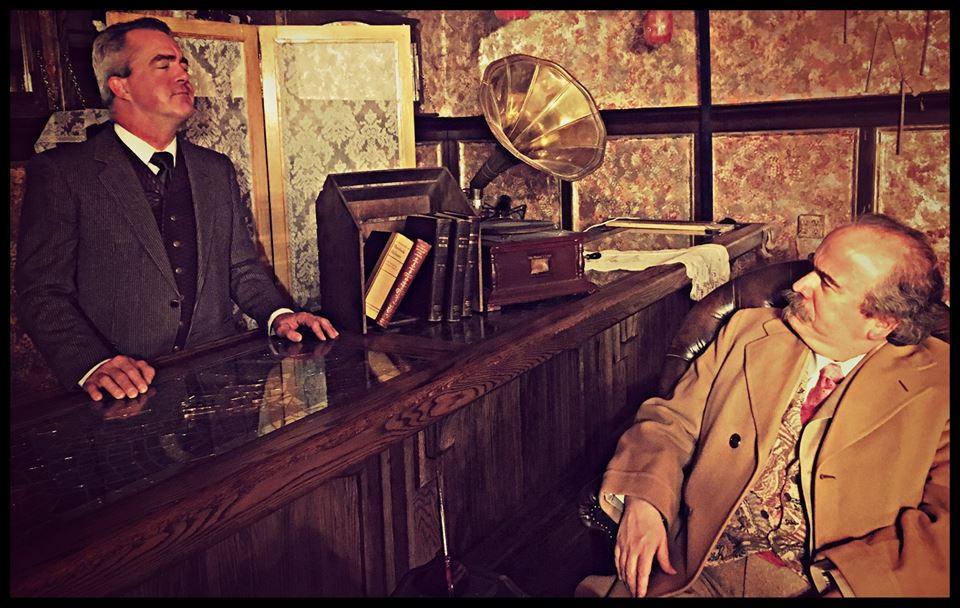
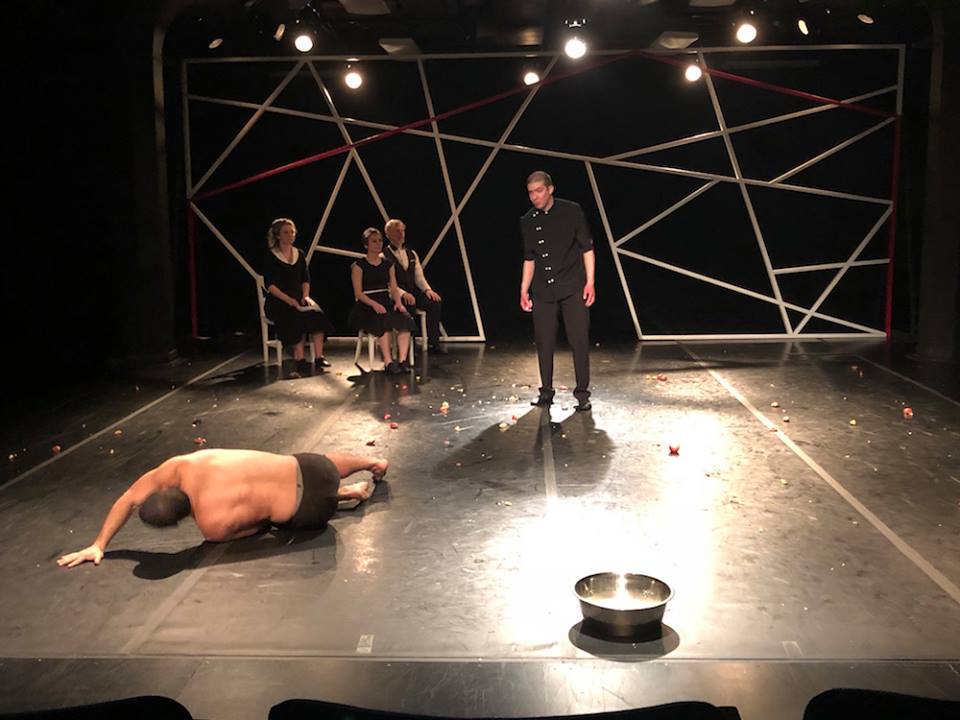
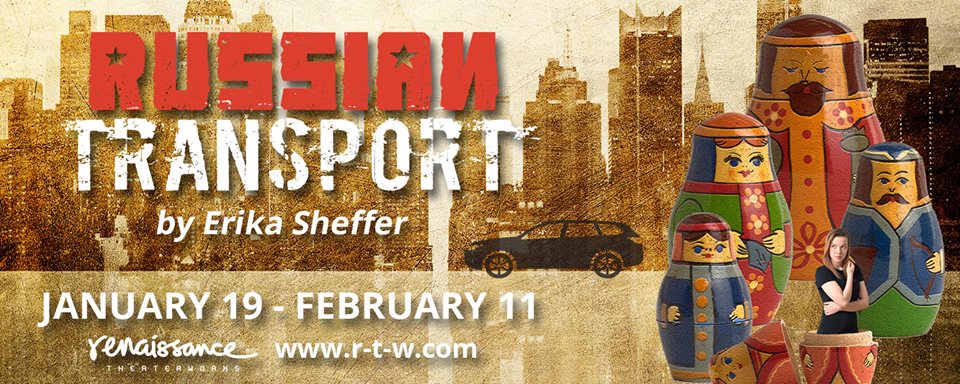

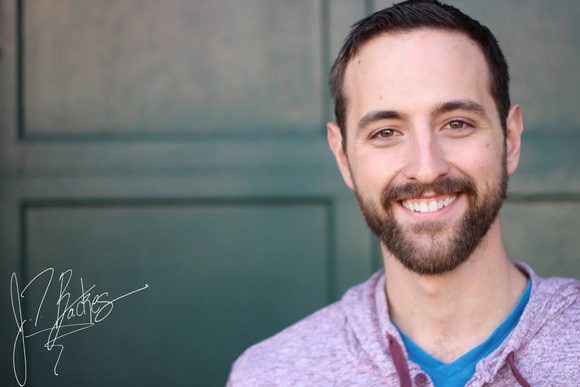


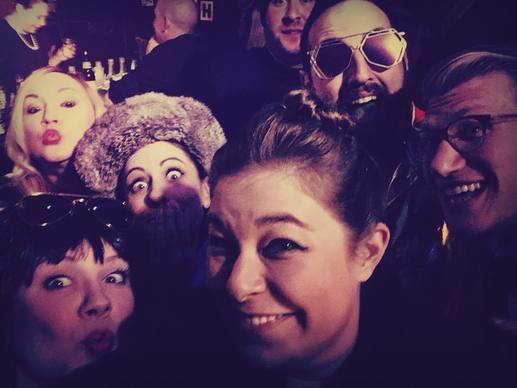
 RSS Feed
RSS Feed
